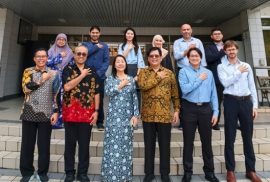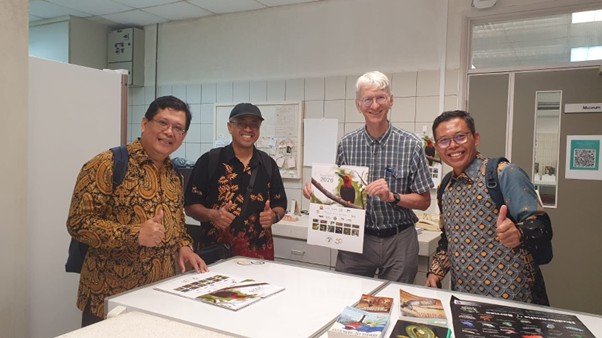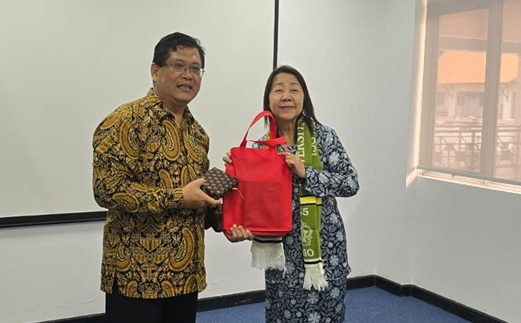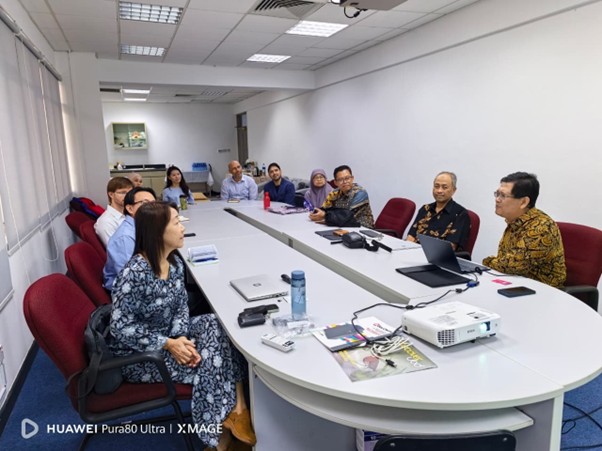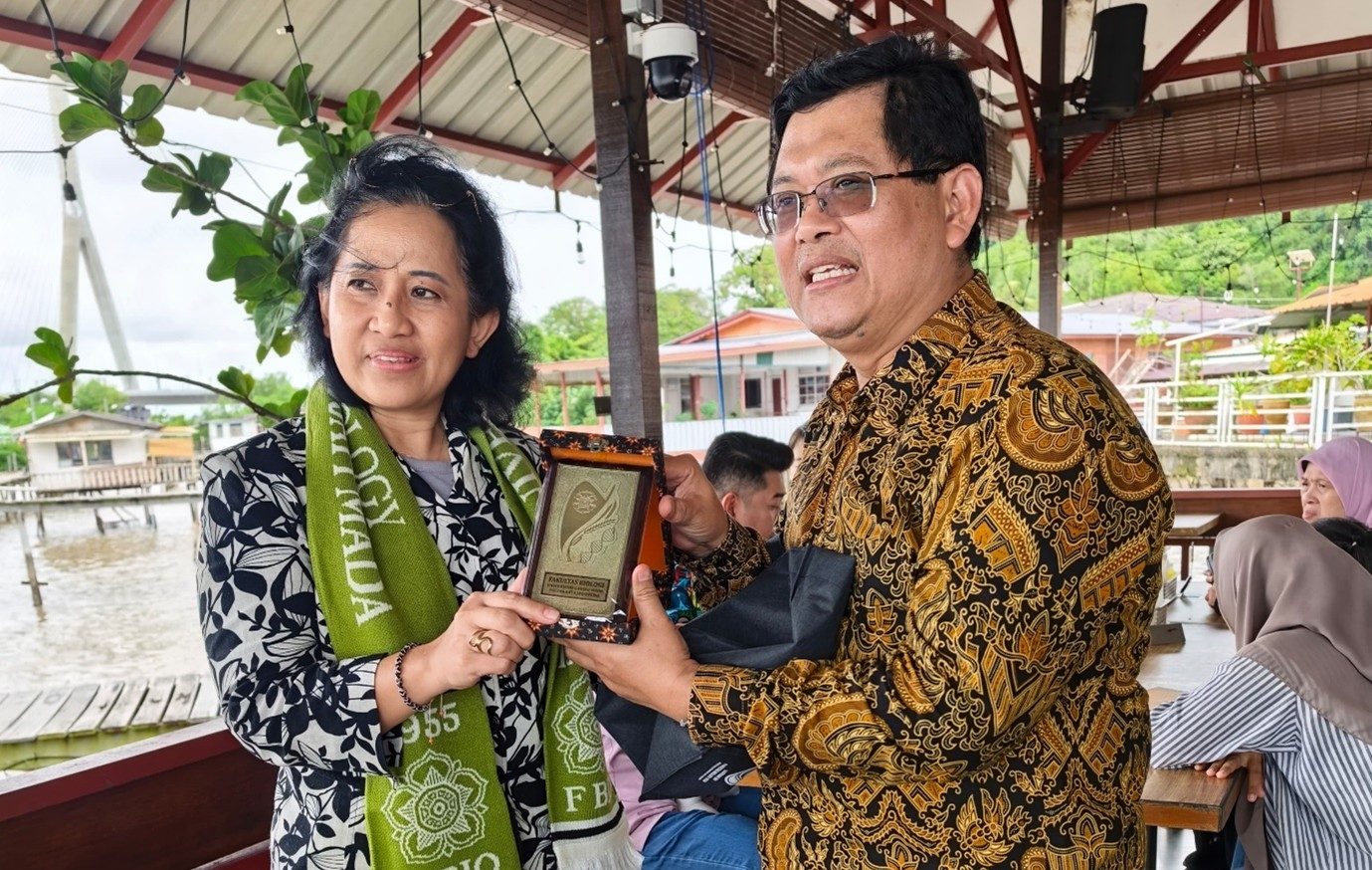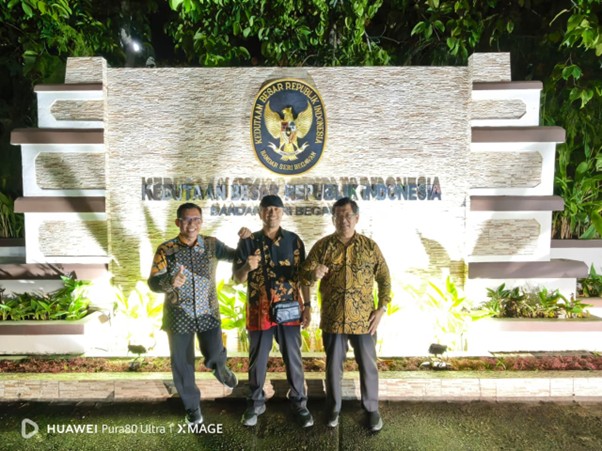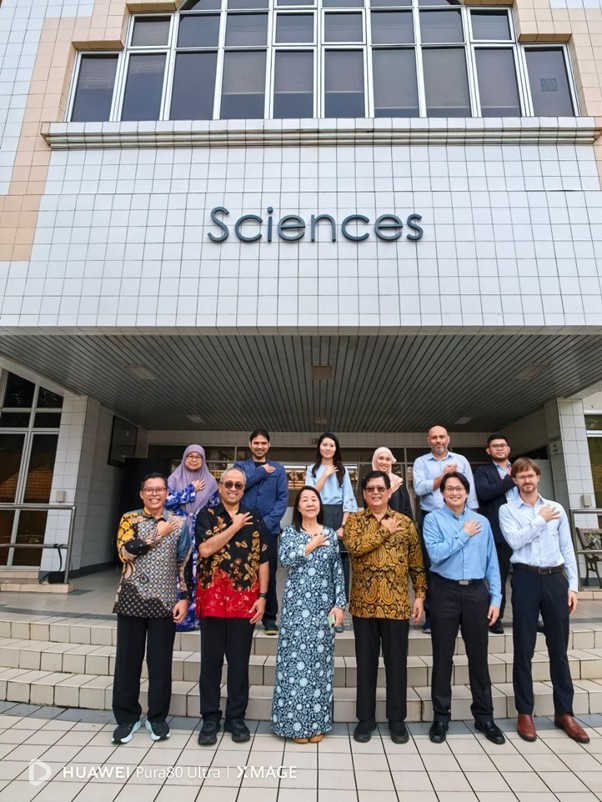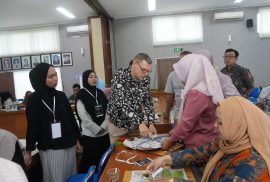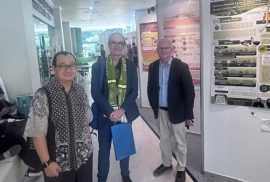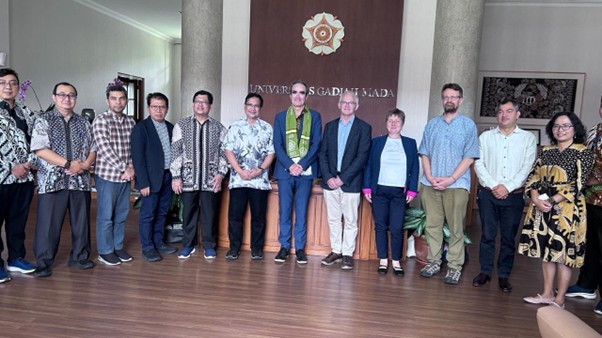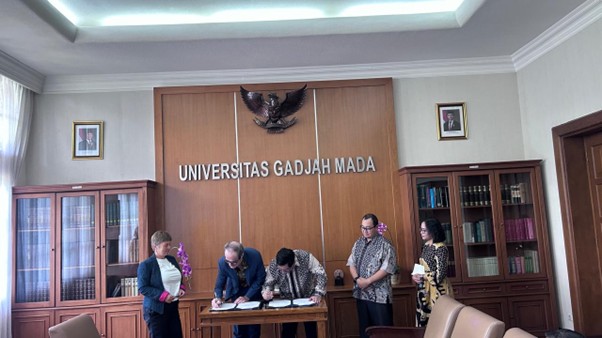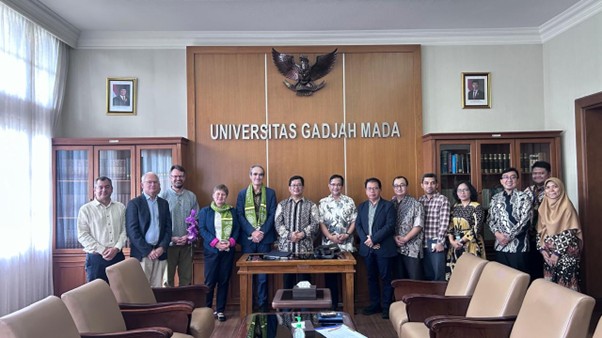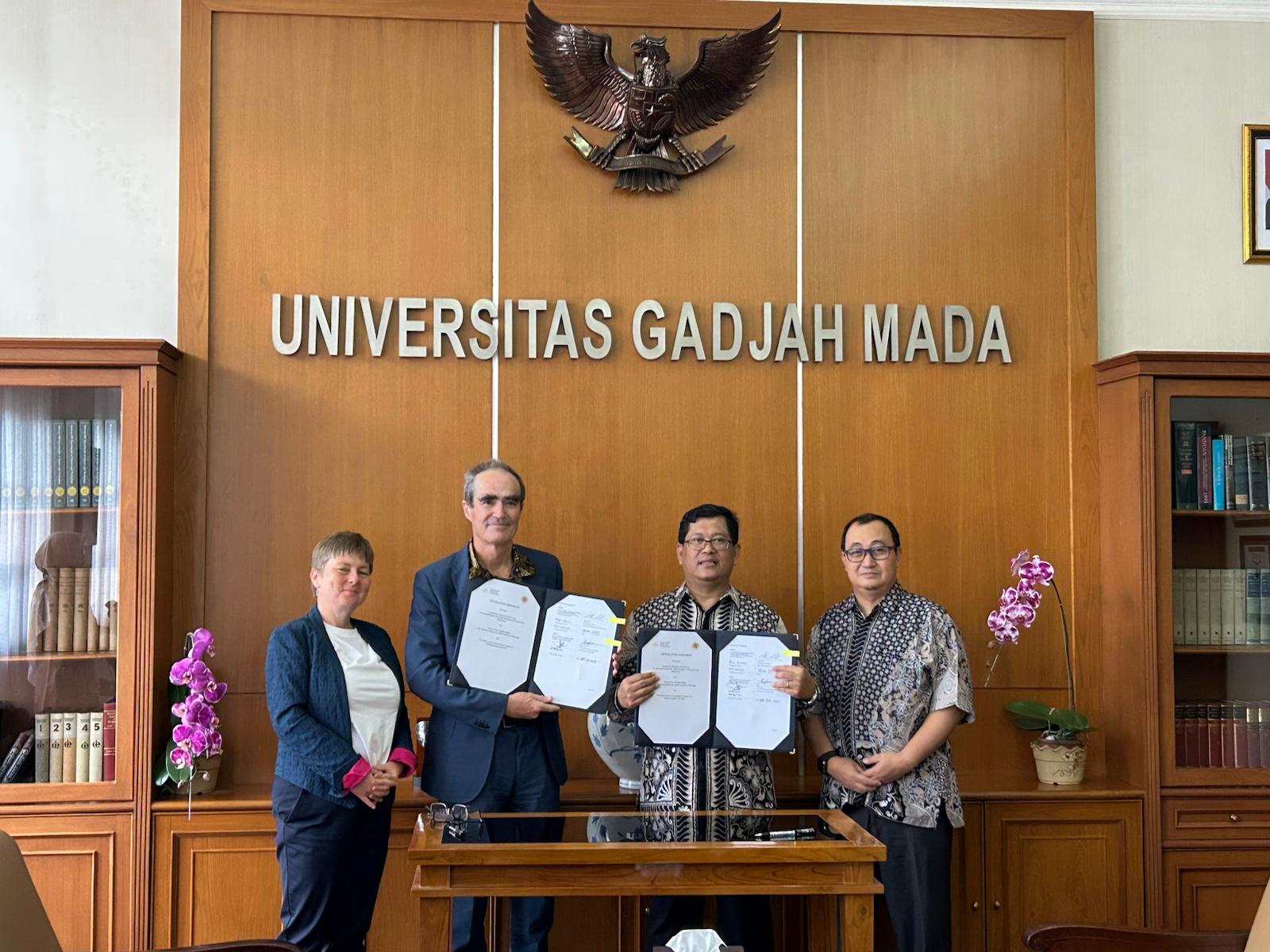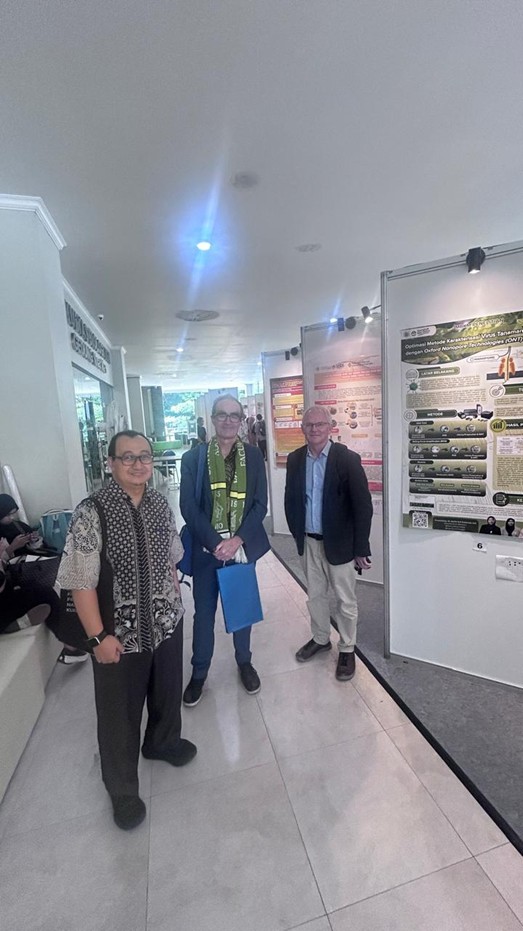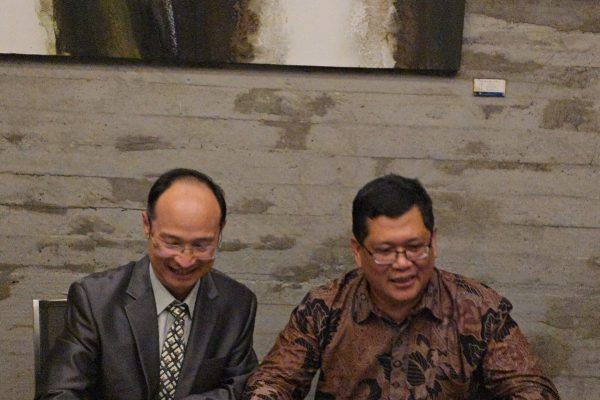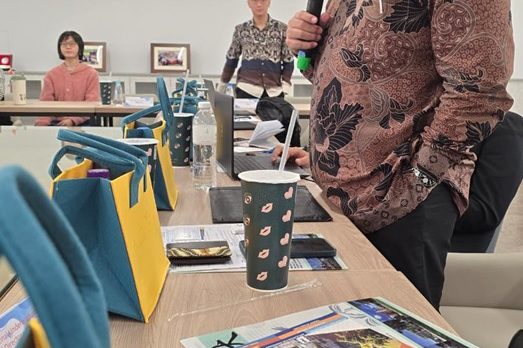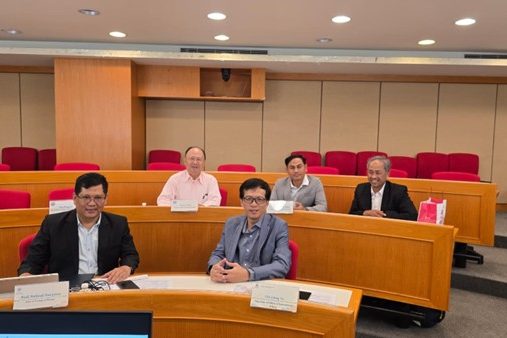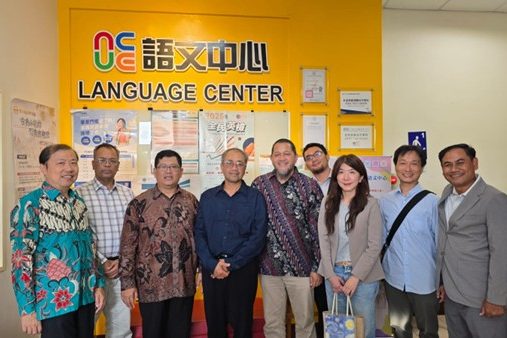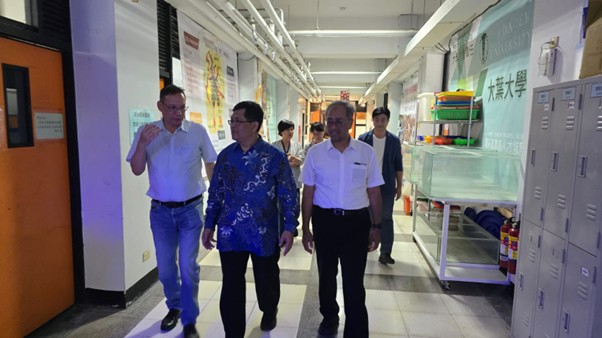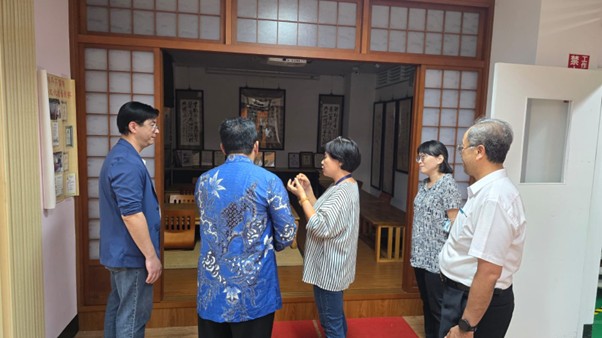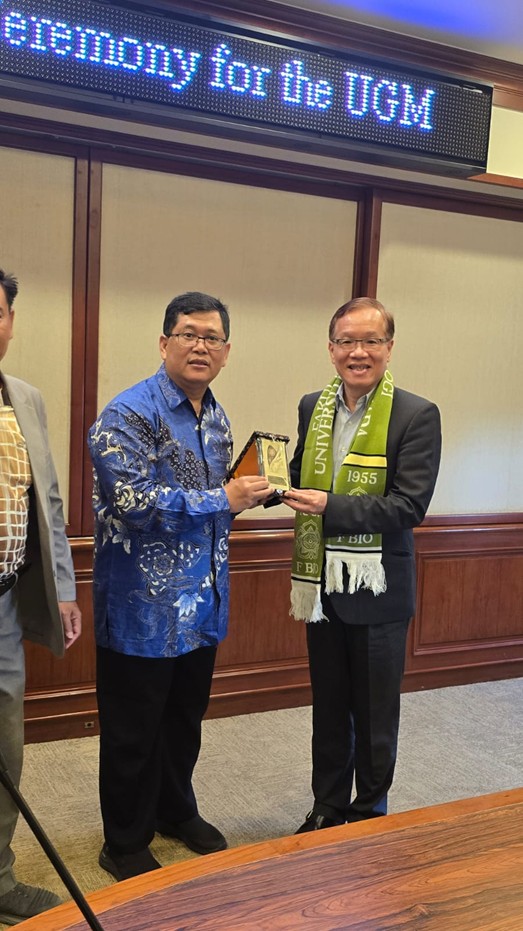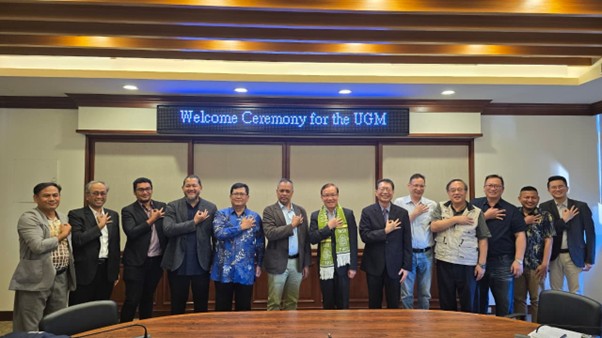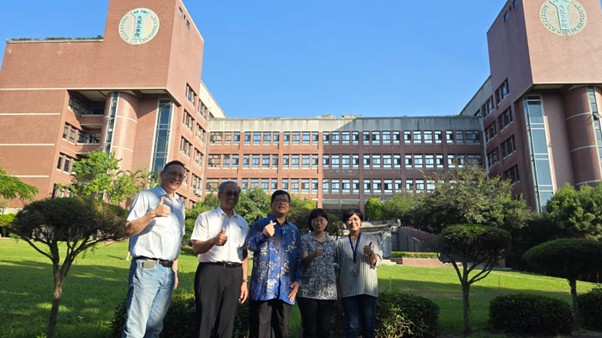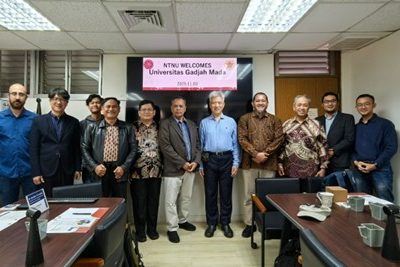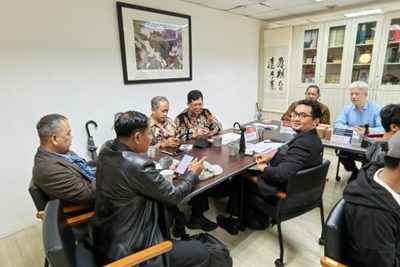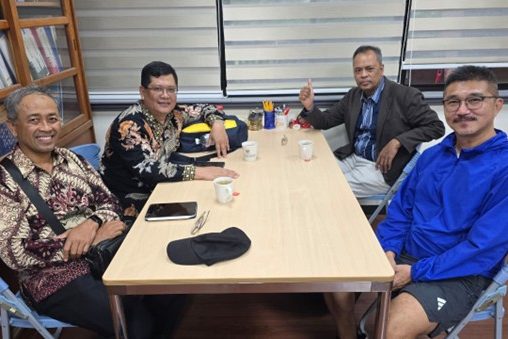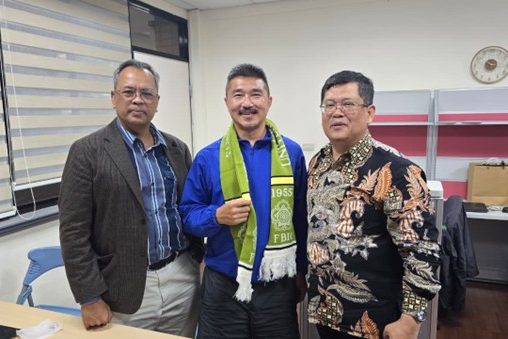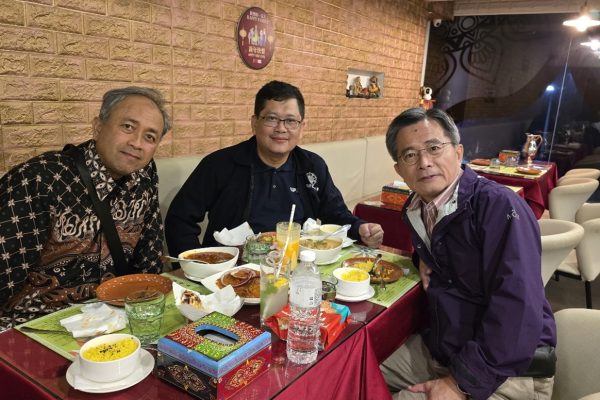Arsip:
Cooperation
Brunei Darussalam, 9 December 2025 — The Faculty of Biology at Universitas Gadjah Mada (UGM) continues to expand its international collaboration network through a strategic partnership with the University of Brunei Darussalam (UBD), carried out with full support from the Embassy of the Republic of Indonesia (KBRI) in Brunei Darussalam. The meeting was attended by a delegation from the Faculty of Biology UGM led by the Dean, Prof. Dr. Budi Setiadi Daryono, M.Agr.Sc., accompanied by Dr. Bambang Retnoaji, M.Sc., Vice Dean for Academic and Student Affairs, and Dr. Slamet Widiyanto, M.Sc., Vice Dean for Finance, Assets, and Human Resources. The UGM delegation was warmly welcomed by the Indonesian Deputy Ambassador to Brunei Darussalam, Roos Diana Iskandar, as well as Agus Buana, Coordinator for Social and Cultural Affairs at KBRI. Meanwhile, the meeting with UBD was received by the Dean of the Faculty of Science, Lim Lee Hoon, Ph.D.; Faizah Metali, Ph.D., Programme Leader for Environmental & Life Sciences; and Dr. Ulmar Grafe from the Department of Environmental Life Sciences.
This collaboration initiative builds on the success of the 2024 student exchange program, through which the Faculty of Biology UGM hosted a student from UBD’s Faculty of Science, Nurjanah Amalia Munaf, for academic activities at UGM. During the recent meeting, both institutions agreed to strengthen cooperation in three key areas: first, the development of a two-way student exchange program between the Department of Environmental Life Sciences, Faculty of Science UBD, and the Faculty of Biology UGM; second, the implementation of joint supervision for undergraduate and master’s students from both universities; and third, the preparation of joint publications resulting from collaborative research conducted under the joint supervision scheme.
Both UGM and UBD share a strong commitment to ensuring that this collaboration opens wider opportunities for knowledge exchange, enhances research quality, and strengthens academic capacity in the life sciences. The partnership also represents a concrete contribution by both institutions toward advancing the Sustainable Development Goals (SDGs), particularly SDG 4 (Quality Education), SDG 15 (Life on Land), and SDG 17 (Partnerships for the Goals), through high-quality education, biodiversity conservation efforts, and sustainable global collaboration. With increasingly close synergy, this partnership is expected to become an important step toward more inclusive and impactful biological research and education across the Southeast Asian region.
Yogyakarta, 3 December 2025 — The INUCoST (Indonesian-Netherlands Universities Consortium for Sustainable Futures) Team of the Faculty of Biology, Universitas Gadjah Mada (UGM), successfully held a training program titled “Hands-on Workshop: How to Make Herbarium and Identification of Nusantara Spices” on Saturday (29/11). Taking place at the Tropical Biology Auditorium, the event served as a strategic platform to promote biodiversity conservation while exploring the immense potential of Indonesia’s rich spice heritage.
The workshop was officially opened by the Dean of the Faculty of Biology UGM, Prof. Dr. Budi Setiadi Daryono, M.Agr.Sc., who also serves as the Coordinator of Work Package 2 of the INUCoST Team. In his remarks, Prof. Budi emphasized the importance of synergy between botanical sciences and industry needs to ensure the sustainability of Indonesia’s natural resources.
A key highlight of this event was the unique collaboration between international academic expertise and local industry practitioners. Serving as speakers were Prof. Dr. rer.nat. P.J.A. Kessler from Hortus Botanicus, IBL Plant Science – Institute of Biology Leiden, the Netherlands, and Asri Saraswati Iskandar, Founder of Agradaya, a social enterprise focused on the sustainable development of spices in Yogyakarta.
In the first session, Asri Saraswati Iskandar shared insights on spices from an industry perspective. She discussed the economic value and vast market potential of Indonesian spices in today’s global landscape, providing a clear picture of how biological commodities can be managed professionally while generating social impact.
The next session focused on more scientific and technical aspects with Prof. Kessler. Participants were introduced not only to plant identification theory but also engaged in hands-on herbarium preparation techniques using Nusantara spice specimens. Prof. Kessler underscored that standardized herbarium preparation is essential as a foundational taxonomic database and a valid reference for future botanical research.
This activity also aligns with several Sustainable Development Goals (SDGs), specifically SDG 4 (Quality Education), SDG 15 (Life on Land), and SDG 17 (Partnerships for the Goals). Through knowledge transfer from international experts and collaboration with industry partners, the Faculty of Biology UGM aims to strengthen human resource capacity in biodiversity conservation while fostering inclusive and sustainable global partnerships.
The enthusiasm of participants was evident from the highly interactive discussions throughout the event. By combining technical herbarium-making skills with industry perspectives, the workshop is expected to equip participants with comprehensive knowledge, empowering them to contribute to the preservation and innovative utilization of Indonesia’s spice biodiversity.
Yogyakarta, 28 November 2025 — Universitas Gadjah Mada (UGM) welcomed a delegation from the Australian National University (ANU), Australia, to discuss the extension of the undergraduate Double Degree program with the Faculty of Biology and explore broader prospects for strategic collaboration with the university. The meeting took place in the Meeting Room of the Rector’s Office at UGM. The ANU delegation was led by Professor Kiaran Kirk, Dean of the College of Science and Medicine, accompanied by Professor Stephen Eggins, Dean of the College of Systems and Society; Professor Maja Adamska, Associate Director of Education at the College of Science and Medicine, Research School of Biology; Associate Professor Jeremy Smith from the College of Systems & Society, School of Engineering; and Leonardo Alfonzo, Regional Manager for International Relations and Partnerships – STEMM.
From UGM, the meeting was attended by Prof. Dr. Puji Astuti, S.Si., M.Sc., Apt., Director of Partnerships, Alumni, and International Affairs of UGM, accompanied by Tyas Iksan Hikmawan, Ph.D., Head of the Office of International Affairs (KUI) UGM. Also present were Prof. Dr. Budi Setiadi Daryono, M.Agr.Sc., Dean of the Faculty of Biology; Dr. Eko Agus Suyono, M.App.Sc., Vice Dean for Research, Community Service, Collaboration, and Alumni; Nur Indah Septriani, Ph.D., Head of the International Affairs Office of the Faculty of Biology; and Matin Nuhamunada, Ph.D., Secretary of the Biology International Affairs Office. In addition, the meeting was attended by Prof. dr. Yodi Mahendradhata, M.Sc., Ph.D., FRSPH, Dean of the Faculty of Medicine, Public Health, and Nursing; Prof. Dr.-Ing. Ir. Agus Maryono, IPM, ASEAN Eng., Dean of the Vocational College; and Prof. Ir. Ali Awaludin, S.T., M.Eng., Ph.D., IPU, ACPE, Vice Dean for Research, Community Service, and Collaboration of the Faculty of Engineering.
Opening the discussion, Prof. Puji Astuti expressed her warm welcome and appreciation for the longstanding partnership between UGM and ANU, highlighting the strong foundation of collaboration that has been built over the years. The meeting continued with discussions on strengthening and expanding the partnership through initiatives such as the Enhancing Quality Education for International University Impacts and Recognition (EQUITY WCU) program, the New Colombo Plan, and academic collaboration schemes with potential support from the Indonesia Endowment Fund for Education (LPDP).
A major highlight of the meeting was the signing of the extension of the Double Degree Undergraduate Program between the Faculty of Biology UGM and the College of Science and Medicine ANU. The collaboration, which has been running since 2018, has been reaffirmed following the graduation of the program’s first two participants, Vanessa and Sabut, who successfully completed their studies at both UGM and ANU in 2025. On this occasion, Prof. Budi emphasized that the continuation of this program represents a strategic opportunity for UGM to broaden global academic exposure for students while enhancing their competencies through high-quality international learning experiences.
Beyond the undergraduate collaboration, discussions also explored the potential for multidisciplinary research partnerships involving the Faculty of Biology, the Faculty of Medicine, Public Health, and Nursing, the Faculty of Engineering, and the Vocational College. Both institutions exchanged ideas on potential research topics that could be developed collaboratively, including biology, public health, systems engineering, and technological innovations supporting sustainable development.
The agenda proceeded with a Faculty Tour to the Faculty of Biology UGM, specifically to the ongoing Research Day activities. The ANU delegation was introduced to various research initiatives, academic activities, and established collaborations within the faculty.
Concluding the visit, UGM and ANU expressed their shared hope that the strengthened partnership will not only advance academic excellence but also generate real contributions to society through alignment with the Sustainable Development Goals (SDGs). The collaboration supports SDG 4 on quality education through international mobility and capacity building, SDG 9 on innovation and impactful research, and SDG 17 on strengthening global partnerships. Moving forward, both institutions expect this cooperation to evolve into a model of international academic partnership that drives innovation, enhances human resource capacity, and reinforces the essential role of higher education institutions in addressing global challenges.
Yogyakarta, 21 November 2025 — The Faculty of Biology, Universitas Gadjah Mada (UGM), welcomed a visit from the Indonesian Biodiversity Indicator Foundation (YIBI) together with World Wildlife Fund (WWF) Indonesia. The visit marked the official initiation of a collaborative partnership between the Faculty of Biology UGM and the Indonesian Biology Consortium (KOBI) with YIBI.
Held in the KPTU Meeting Room of the Faculty of Biology UGM, the meeting was attended by Prof. Ir. Ign. Pramana Yuda, M.Si., Ph.D., Chair of YIBI; Barano Siswa Sulistyawan, Ph.D., Vice Chair of YIBI (joining online); Prof. Dr. Jarulis, S.Si., M.Si., Secretary of YIBI; and Paskalina Th. Litaay, M.Sc., Treasurer of YIBI. Representing WWF Indonesia were Muhammad Ali Imron, Director of Forest & Wildlife WWF Indonesia, and Oki Hadian Hadadi. Also present were Saufina Athaya Putri Nugraha, S.PWK and R.A. Callysta Sevanda Calyacetta from YIBI, serving as Administrative Support and Data Statistics officers. The delegation was welcomed by Prof. Dr. Budi Setiadi Daryono, M.Agr.Sc., Dean of the Faculty of Biology UGM and Chair of KOBI, accompanied by Prof. Dr. Suwarno Hadisusanto, Advisor of KOBI, and Dr. Eko Agus Suyono, M.App.Sc., Vice Dean for Research, Community Service, Collaboration, and Alumni Affairs of the Faculty of Biology UGM.
Opening the discussion, Prof. Pramana Yuda expressed his strong support for the upcoming collaboration between YIBI and the Faculty of Biology UGM. Dean Prof. Budi likewise affirmed the Faculty’s commitment to advancing this partnership. Through this collaboration, YIBI, KOBI, WWF Indonesia, and the Faculty of Biology UGM aim to jointly develop the Indonesian Biodiversity Index (IBI), with a focus on enriching primary data sources, strengthening researcher collaboration, and expanding biodiversity research efforts across various regions in Indonesia.
WWF Indonesia Director Ali Imron emphasized that the IBI is expected to become a key instrument and an indicator capable of guiding national sustainable development initiatives.
The event continued with the official signing of cooperation agreements between YIBI and the Faculty of Biology UGM, as well as between YIBI and KOBI. Through this formalization, all parties hope to build a stronger collaborative ecosystem for monitoring, managing, and conserving Indonesia’s biodiversity, ensuring that research findings and generated data can be utilized to support policymaking, education, and ecosystem restoration in the future.
As a commitment to sustainable development, this collaboration also supports the achievement of several Sustainable Development Goals (SDGs), particularly SDG 13 (Climate Action), SDG 14 (Life Below Water), and SDG 15 (Life on Land). Moreover, it aligns with SDG 17 (Partnerships for the Goals) by strengthening synergy among academia, conservation organizations, and national institutions in safeguarding biodiversity as a foundation for the nation’s long-term prosperity.
Yogyakarta, 30 October 2025 — The Faculty of Biology, Universitas Gadjah Mada (UGM), hosted a Guest Lecture featuring Dr. Axel Dalberg Poulsen from the Royal Botanic Garden Edinburgh, presenting an engaging topic titled “How Many Gingers Are in Borneo?” The event took place at the Tropical Biology Auditorium and was attended by lecturers and students of the Faculty of Biology UGM.
The lecture began with opening remarks from Prof. Dr. Budi Setiadi Daryono, M.Agr.Sc., Dean of the Faculty of Biology UGM, who expressed his appreciation for Dr. Axel’s visit. In his speech, Prof. Budi conveyed his hope that this event would serve as a gateway for further collaboration in research and academic exchange between the Faculty of Biology UGM and the Royal Botanic Garden Edinburgh.
In his lecture, Dr. Axel presented an overview of the Zingiberaceae family (gingers), which consists of around 2,000 species worldwide. On the island of Borneo alone, there are approximately 24 genera and 260 species. However, these numbers remain dynamic, as new species continue to be discovered and taxonomic classifications are periodically revised. Dr. Axel introduced several ginger species that he and his colleagues have encountered throughout the island of Borneo (Kalimantan).
He also highlighted the challenges in ginger research, including difficulties in collecting field samples, limited access to type localities, and constraints in molecular studies. Additionally, many older specimens have deteriorated and can no longer be used, necessitating recollection from their original locations.
Dr. Axel encouraged students to actively participate and collaborate in plant biodiversity research in Indonesia, particularly within the Zingiberaceae family. The session was met with great enthusiasm from students, who engaged actively during the interactive and inspiring discussion and Q&A.
This guest lecture not only provided valuable insight and inspiration for students but also reflected the Faculty of Biology UGM’s commitment to the Sustainable Development Goals (SDGs)—particularly SDG 15: Life on Land, through enhancing understanding and conservation of biodiversity, and SDG 17: Partnerships for the Goals, by fostering international collaboration in tropical biodiversity research.
Changhua, Taiwan, 6 November 2025 — The Faculty of Biology, Universitas Gadjah Mada (UGM), conducted an official visit and academic collaboration exploration with the National Changhua University of Education (NCUE), Taiwan, aimed at strengthening international partnerships in education, research, and student mobility. The delegation from the Faculty of Biology UGM was led by Prof. Dr. Budi Setiadi Daryono, M.Agr.Sc., Dean of the Faculty of Biology, accompanied by Prof. Dr. Bambang Retnoaji, M.Sc., Vice Dean for Academic and Student Affairs. Also joining the delegation were representatives from other faculties, including Prof. Roto, Ph.D., Vice Dean for Academic and Student Affairs of the Faculty of Mathematics and Natural Sciences (MIPA), Dr. Erliss Sulistyarini, Vice Dean for Academic and Student Affairs of the Faculty of Geography accompanied by Dr. Andung Bayu Sekti, and Arif Misbahul, Director of the Taiwan Center UGM.
The NCUE representatives included several key officials: Prof. Chi-Yen Huang, Ph.D., Dean of the College of Science and Director of the Center for Science Education; Prof. Yeong-Lin Lai, Ph.D., Dean of the College of Engineering; Prof. Shih-Feng Fu, Ph.D., Department of Biology; Prof. Hon-Man Lee, Ph.D., Dean of the Office of International and Cross-Strait Affairs; Associate Prof. Yang, Wen-Ren, Ph.D.; Assistant Prof. Chien-Sing Lee; Hsiu-Gui Chang, Division Head of International and Cross-Strait Affairs; and Yu-Yen Lee, Coordinator of the Office of International and Cross-Strait Affairs.
The formal meeting commenced at 10:00 a.m. Taiwan time and began with presentations from both deans. During his presentation, Dean of the Faculty of Biology UGM, Prof. Budi Setiadi Daryono, introduced the Faculty’s profile and shared potential collaboration opportunities in biodiversity, conservation, and other areas of biological sciences. The main agenda of the meeting included the signing of an academic cooperation agreement between the two institutions, focusing on the development of Student Exchange, Double Degree, Co-supervision, and Fast Track programs. This collaboration is expected to enhance academic mobility opportunities for students and lecturers, as well as strengthen cross-border collaborative research.
In addition, NCUE offered scholarship quotas for up to 48 students Faculty of Biology UGM to participate in student exchange and industrial internship programs in Taiwan. The program also provides opportunities for graduates to work directly in Taiwan under an initial two-year contract, with the possibility of extension. Prospective students are expected to have a minimum Mandarin proficiency of A2 level as a participation requirement.
Following the meeting at NCUE, the Faculty of Biology UGM delegation also made an official courtesy visit to Asia University, Taiwan, where they were warmly received by Prof. Chi-Liang Yu, Vice Dean of the Office of International Affairs, and Jeanie Mao from the same office. The discussion focused on exploring further opportunities for joint research and academic staff exchange programs.
This visit marks a significant step for the Faculty of Biology UGM in expanding its international network, enhancing global competitiveness, and providing students with broader academic and professional experiences on the international stage. The initiative also aligns with the Faculty’s commitment to supporting the Sustainable Development Goals (SDGs), particularly SDG 4 (Quality Education), SDG 17 (Partnerships for the Goals), and SDG 15 (Life on Land), through advancing biological education, fostering global collaboration, and promoting biodiversity conservation.
Changhua, Taiwan, November 6, 2025 — As part of its ongoing commitment to strengthening global engagement and enhancing academic excellence, the Faculty of Biology, Universitas Gadjah Mada (UGM), conducted an official visit to DaYeh University, located at No.168, University Rd., Dacun, Changhua 515006, Taiwan (R.O.C.). The visit aimed to broaden international collaboration in education, research, and student mobility through various strategic programs.
The delegation from the Faculty of Biology UGM was led by Prof. Dr. Budi Setiadi Daryono, M.Agr.Sc., Dean of the Faculty of Biology, accompanied by Prof. Dr. Bambang Retnoaji, M.Sc., Vice Dean for Academic and Student Affairs. The delegation also included representatives from other faculties: Prof. Roto, Ph.D., Vice Dean for Academic and Student Affairs of the Faculty of Mathematics and Natural Sciences (MIPA); Dr. Erliss Sulistyarini, Vice Dean for Academic and Student Affairs of the Faculty of Geography; Dr. Andung Bayu Sekti; and Arif Misbahul, Director of the Taiwan Center UGM.
DaYeh University was represented by several university leaders, including Prof. Dr.-Ing. Shih-Jen Yeh, Vice President of DaYeh University; Prof. Yi-Ching Chen, Ph.D., Department of Engineering; Prof. Yi-Lin Chen, Ph.D., Department of Environmental and Safety Engineering; Prof. Daniel Yuen-The Liu, Vice Dean, Office of Foreign Affairs; and Asst. Prof. Wen-Kuang Hsu, Ph.D., Department of Medicinal Botanical and Food on Health Applications.
The meeting began with institutional profile presentations from both universities. In his presentation, Prof. Budi Setiadi Daryono highlighted the achievements and vision of the Faculty of Biology UGM in tropical biology research and education, as well as potential areas of collaboration in biodiversity, conservation, biotechnology, and biomedicine. The main discussion focused on developing joint programs such as Double Degree, Student Exchange, Co-supervision, and Fast Track schemes, followed by a tour of Dayeh University’s laboratory facilities. Both institutions also explored potential collaborative research in biomedical sciences—particularly studies on lung and ovarian cancer—as well as research in food and nutritional sciences and environmental sciences. Further discussions included projects involving zebrafish as a model organism and the development of plant tissue culture for various commodities such as roses, strawberries, and bananas.
As part of the collaboration initiative, DaYeh University offered scholarship opportunities for up to 20 students from the Faculty of Biology UGM to participate in Double Degree programs in biomedical and environmental sciences. This program provides students with valuable international academic experience and the opportunity to build professional networks in Taiwan.
This visit marks a strategic step for the Faculty of Biology UGM in expanding international partnerships, strengthening collaborative research capacity, and supporting the university’s mission of advancing higher education internationalization and global competitiveness. The initiative also aligns with the Faculty’s commitment to the United Nations Sustainable Development Goals (SDGs), particularly SDG 4 (Quality Education), SDG 9 (Industry, Innovation, and Infrastructure), SDG 15 (Life on Land), and SDG 17 (Partnerships for the Goals), through efforts to enhance the quality of biological education, promote innovative cross-disciplinary research, foster global collaboration, and contribute to biodiversity conservation and sustainable scientific development.
UGM Faculty of Biology Strengthens International Network through Visit to National Taiwan University
Taipei, November 2, 2025 — The Faculty of Biology, Universitas Gadjah Mada (UGM), continues to expand its international collaboration network through a visit to National Taiwan University (NTU). The visit was represented by Prof. Dr. Budi Setiadi Daryono, M.Agr.Sc., Dean of the Faculty of Biology UGM, and Prof. Dr. Bambang Retnoaji, M.Sc., Vice Dean for Academic and Student Affairs, along with delegates from the Faculty of Geography and the Faculty of Mathematics and Natural Sciences UGM.
The UGM delegation also visited the Faculty of Liberal Arts, National Taiwan Normal University (NTNU), which focuses on Ecology and Environmental Studies. The visit was warmly received by Prof. Tsong-han Lee, Prof. Joan Chiung-Huei Chang, and Prof. Wen-Cheng Wang.
In addition, the Faculty of Biology UGM delegation visited National Taiwan University (NTU), where they were warmly welcomed by Prof. Yao-Chien Alex Chang from the Department of Horticulture, NTU. The meeting discussed various opportunities for academic and research collaboration between the two institutions. The discussions at NTU also involved Prof. Ting-Hsuan Hung, Associate Dean of the College of Bioresources and Agriculture, and Jack Hsi from the NTU Office of International Affairs.
Several potential collaborations were initiated during the visit, including Double Degree programs, staff and student exchange programs, and invited/keynote speaker opportunities for the International Summer Course (ISC) held annually by the Faculty of Biology UGM.
Through this collaboration, both parties aim to strengthen the quality of education and research in the field of biology and to foster sustainable innovation that contributes to global development. This initiative is also part of the Faculty of Biology UGM’s commitment to supporting the achievement of the Sustainable Development Goals (SDGs), particularly SDG 4 (Quality Education) through enhanced international learning access, SDG 15 (Life on Land) through strengthened research in biodiversity and conservation, and SDG 17 (Partnerships for the Goals) through the expansion of sustainable global partnerships.
Yogyakarta, October 23, 2025 — The Faculty of Biology, Universitas Gadjah Mada (UGM), held a workshop titled “Investing in the Future: Cultivating Excellence in Science and Biology Learning” at the Tropical Biology Auditorium. The event was attended by 130 principals and teachers from 78 senior high schools across 19 provinces in Indonesia, highlighting the Faculty’s commitment to strengthening the synergy between higher education institutions and secondary schools in nurturing future generations of excellence in biology.
The workshop was officially opened by Prof. Dr. Budi Setiadi Daryono, M.Agr.Sc., Dean of the Faculty of Biology UGM, who emphasized the crucial role of biology in addressing global challenges and advancing scientific research. He stated that the Faculty of Biology UGM remains committed to expanding international collaborations, particularly through the International Graduate Program which has established partnerships with leading universities around the world, including several in Taiwan.
As part of the event, a Memorandum of Understanding (MoU) was signed between the Faculty of Biology UGM and 78 partner schools. This agreement marks a strategic step in fostering collaboration that supports teacher development and facilitates students’ pathways to higher education in science and biology.
The workshop continued with an interactive talk show featuring speakers from Indonesia and abroad, focusing on strengthening biology and science education in the era of global transformation and technological advancement.
The first speaker, Prof. Chen Yuh Wen, Director of the Liberal Education Center and D Infinity College, Da-Yeh University, Taiwan, delivered a presentation on the importance of science and biology education in tackling global challenges such as climate change, food security, biotechnology, and the artificial intelligence revolution. Joining virtually via Zoom, Prof. Chen also engaged in discussions with participating teachers about adapting teaching strategies to keep pace with rapid technological developments.
The second speaker, Ganies Riza Aristya, Ph.D., lecturer and researcher at the Genetics and Plant Breeding Laboratory, Faculty of Biology UGM, shared her academic journey during her studies at Tunghai University, Taiwan. She highlighted the supportive academic environment in Taiwan that encourages student creativity and research, as well as its relevance to advancing biological research in Indonesia.
Following her presentation, Arief Misbahul, MBM, Chairman of the Taiwan Center Indonesia, discussed the opportunities for higher education in Taiwan and the collaboration between Universitas Gadjah Mada and Da-Yeh University through the International Undergraduate Program (IUP) in Industrial Biology at the Faculty of Biology UGM. This program offers Indonesian students access to double-degree pathways, as well as internship and employment opportunities in Taiwan’s growing industrial sectors.
Dr. Eko Agus Suyono, Vice Dean for Research, Community Service, Collaboration, and Alumni Affairs, emphasized that this workshop serves as a platform to strengthen collaboration between the Faculty of Biology UGM, the Taiwan Center, Da-Yeh University, and Indonesian high schools. The goal is to enhance human resource quality and increase both the number of students and the employability of alumni from the Faculty’s Industrial Biology IUP.
To conclude the program, participants visited the Integrated Genome Factory (IGF) — one of the leading genomic laboratories at the Faculty of Biology UGM — which provides state-of-the-art genomic and molecular research facilities. The visit offered firsthand experience of how cutting-edge research contributes to innovation in biotechnology.
This workshop demonstrates the Faculty of Biology UGM’s commitment to supporting the achievement of the Sustainable Development Goals (SDGs), particularly SDG 4 (Quality Education), SDG 9 (Industry, Innovation, and Infrastructure), and SDG 17 (Partnerships for the Goals). Through this initiative, the Faculty continues to invest in inclusive, collaborative, and globally competitive science education for a sustainable future.
Sobokerto, 11 September 2025 – PT Pertamina Patra Niaga AFT Adi Sumarmo, in collaboration with the Faculty of Biology, Universitas Gadjah Mada (UGM), organized a Corporate Social Responsibility (CSR) program in the form of a socialization and training session on producing eco-enzymes and silage for animal feed using water hyacinth as raw material. The event, held at Sobokerto Village Hall from 10:30 AM to 1:00 PM, was attended by 40 participants from three community groups: Ngudi Makmur Farmer Group, Tirtokahuripan Fish Cage Group, and Sumber Rezeki Floating Net Group.
The program began with opening remarks from Sobokerto Village Head, Mr. Surahmi, and Junior Supervisor of RSD AFT Adi Sumarmo, Mr. Shoiful Amri. The training featured two main speakers: Dr. Siti Nurbaeti, S.Si., who presented material on utilizing water hyacinth for eco-enzyme production, and Dr. Aprilia Sufi Subiastuti, S.Si., who delivered a session and hands-on practice on producing silage for animal feed. Following the presentations, all participants actively engaged in the practical session of making eco-enzymes and silage. Interestingly, this was the first time the participants were introduced to these technologies, yet they showed great enthusiasm throughout the training.
The event was also attended by Novita Yustinadiar, S.Si., M.Si., a doctoral student at the Faculty of Biology UGM, who supported the community service activities as part of achieving Key Performance Indicator (KPI) 2, which emphasizes student learning experiences beyond the campus. As a step to strengthen cooperation, a Memorandum of Understanding (MoU) was also signed between PT Pertamina Patra Niaga AFT Adi Sumarmo and the Faculty of Biology UGM.
This activity has strong relevance to the achievement of the Sustainable Development Goals (SDGs). Through the training, the community is expected to transform water hyacinth—long considered a weed—into eco-friendly and valuable products. The utilization of water hyacinth for eco-enzymes and bio-absorbents contributes to water quality improvement and aquatic ecosystem preservation, supporting SDG 6 (Clean Water and Sanitation) and SDG 14 (Life Below Water). The production of silage for animal feed enhances livestock feed security and supports SDG 2 (Zero Hunger). Repurposing waste into value-added products promotes responsible consumption and production in line with SDG 12, while the collaboration among companies, universities, and communities reflects the spirit of SDG 17 (Partnerships for the Goals).
Through this initiative, the Sobokerto community is expected to become more empowered in managing local environmental resources while fostering economic, ecological, and social sustainability by turning water hyacinth into value-added products.

